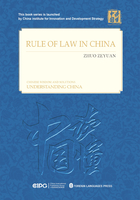
Chapter 2. From “Competition of a Hundred Schools” to “Supremacy of Confucianism”
After Confucius, China continued to develop. Various ideas and methods of state governance emerged. The Legalism of the Spring and Autumn Period and the Warring States Period was a major school of thought. Legalism was an ancient school emphasizing the rule of law. It originated from the Xia and Shang dynasties and thrived in the Spring and Autumn Period and the Warring States Period along with “the Competition of a Hundred Schools”. The learning to which the legal philosophers attached great importance was also called the philosophy of the legal school. Representatives of the school include Guan Zhong, Zi Chan, Li Kui, Wu Qi, Shang Yang, Shen Dao, Shen Buhai and so on. Han Fei, who lived during the late Warring States Period, summed up their discourses into the philosophy of the legal school, which involved politics, law, economy, culture, and management. Shang Yang (c. 390-338 BC), a statesman, thinker and major representative of the school of thought, applied it to the governance of the State of Qin, and introduced reform to make Qin a strong state, which eventually conquered and unified all six states into a strong empire. That is one of the reasons for the school of thought to remain highly influential in China for thousands of years till today.
Because of the competition of the various schools of thought, Confucianism and Confucius did not hold a very high standing during the Spring and Autumn period, the Warring States period and the Qin Dynasty (221 BC-206 BC). In the Han Dynasty (206 BC-AD 220), after Emperor Wu of Han pressed for Confucianism as the main state ideology, Confucianism and Confucius gradually returned to favor, thus becoming the mainstream political culture of the Chinese society. The Confucian idea of “governing with the rules of propriety” became the basic strategy of governance.
After the Northern Song Dynasty (960-1127), northern China was occupied by the Jin people for the Jin Dynasty, while the Southern Song Dynasty (1127-1279) was established in southern China in 1127. At that time, China was in a state of division, but its society remained stable for a fairly long period of time. The Chinese population reached a new high. According to statistics, its population was 46.7 million in 1110. By 1223, the 16th year of the reign of Emperor Ningzong, the population had increased by 30 million to 76.8 million. This was when the Southern Song poet Xin Qiji wrote the famous poem “Village – in the rhyme of Qingpingle”:
“The eaves are low and the stream is green.
The Wu dialect sounds intoxicating – who is the old woman with white hair?
The elder son is hoeing by the stream, and the second is crafting a chicken coop.
The youngest son is my favorite, peeling lotus by the stream.”
This poem depicts a picturesque scene of rural life. In a family and society like this, it was politically sufficient to have a great and distant monarch and a few loyal officials to assist him. In a regional context, what was more important for a happy family was a capable husband and a virtuous wife, a stern father and filial children, and a few loving brothers and sisters. People would work from sunrise to sunset, contracts and lawsuits being far from their thoughts. If there should be disputes, the rural traditions and family ethics would resolve almost everything. There was no such need for law at all, nor the rule of law.
The rule of man, or rather the rule of propriety or virtue in traditional Chinese society, provided the best strategy for governing a feudal society that lasted for more than 2,000 years. The Confucian culture and its concept of governance of virtue adapted to the needs of the agrarian society and the natural economy, the needs of the monarchy and family ethics. The Chinese society thus made progress in the light of Confucian culture.
However, the Confucian culture gradually exposed its serious problems as society made progress. It was after all not a product of modern industrial society, without the capability to satisfy the needs of a market economy and democracy. In the course of modernization, the rule of propriety or virtue, however glorious it might have been, was clearly outdated. A monarch, however outstanding he might be as an individual, might bring disaster to his country and nation without democracy as the foundation of his rule, especially when he considered himself the sacred ruler and savior of the world.
In a certain sense, the prosperity of society is a testament to the success of state governance, while it also exposes the conservative and backward nature of traditional ways of governing, which must change. The rule of virtue created the best conditions for the development of Chinese society, and dug its own grave at the same time. The traditional rule of virtue no longer met the needs of society. The rule of virtue was a beauty of a particular era in a historical sense. In the face of modernization, it no longer meets the requirements of social development. From this perspective, it will inevitably decline and be replaced by the more advanced rule of law.